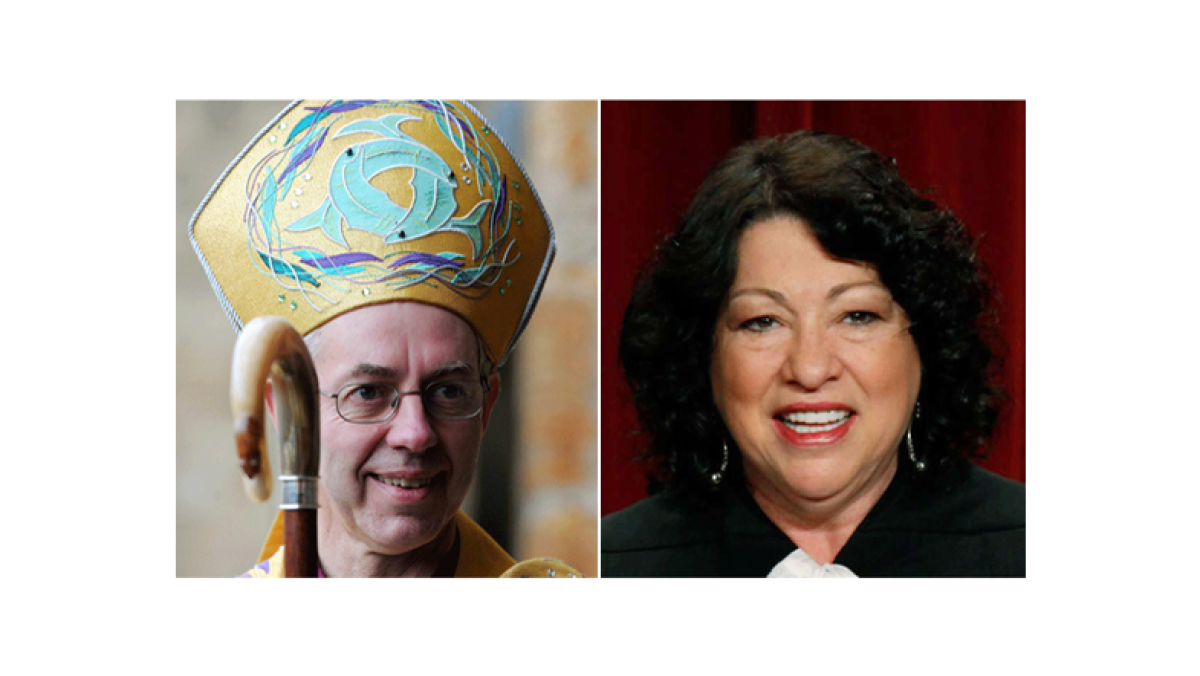Opinion: Are Supreme Court justices becoming ‘party judges’?

- Share via
There’s a tendency for a journalist who covers two beats to start seeing similarities between them. In my career I’ve written a lot about two subjects: religion and the law, and I’m always discerning (or fantasizing) connections between the two. So be forewarned.
I have been struck by how the controversy over whether the Supreme Court justices have become more partisan in recent years parallels a phenomenon I discovered when writing about the Church of England: the “party bishop.”
This term doesn’t refer to a bishop who puts a lampshade on his head at a celebration in the church hall. A party bishop is a prelate who is overly identified with one of the various “parties” or factions in the Church of England.
England’s established church traditionally comprises three parties: Anglo-Catholics who emphasize the church’s pre-Reformation heritage and whose style of worship is sometimes more Catholic than the pope’s; evangelical or low-church Anglicans who stress the church’s Protestant principles; and so-called broad churchmen, who fall in the moderate middle (or muddle).
Bishops in the church come from all of these ecclesiastical subcultures, and there is an unofficial policy of trying to balance appointments among them, particularly when it comes to selection of the Archbishop of Canterbury, the spiritual head of the church. For decades that position has alternated between Anglo-Catholic and evangelical clerics. (The current archbishop, Justin Welby, is an evangelical, but he has good relations with Catholics both “Anglo” and Roman).
Once in office, most bishops try to reach out to parishioners and clergy from all factions of the church. By contrast, the “party bishop” concentrates on preaching to, and communing with, his own faction and surrounds himself with like-minded assistants.
What does this have to do with the Supreme Court? The other day, Adam Liptak of the New York Times wrote a fascinating article titled “The Polarized Court,” which began with this telling factoid: “When the Supreme Court issued its latest campaign decision last month, the justices lined up in a familiar way. The five appointed by Republican presidents voted for the Republican National Committee, which was a plaintiff. The four appointed by Democrats dissented.”
From that case Liptak moved to a general conclusion: “For the first time, the Supreme Court is closely divided along party lines.” That thesis was documented by a chart showing a progressive polarization in the votes of justices appointed by Democratic and Republican presidents. (It’s not clear whether that pattern will hold in the future as issues arise that weren’t on the partisan radar screens of the appointing presidents.)
But partisan voting patterns are only part of the picture. Liptak also discussed another phenomenon: the fact that sitting justices increasingly choose law clerks who share their ideologies and consort off the bench with conservative or liberal “constituencies” (“fan clubs” might be a better term).
Liptak wrote:
“Justices [Antonin] Scalia, [Clarence] Thomas and Samuel A. Alito Jr. have addressed the Federalist Society, a conservative group, while Justices [John Paul] Stevens, [Ruth Bader] Ginsburg and [Stephen] Breyer spoke to the American Constitution Society, a liberal group. Justice [Sonia] Sotomayor is a featured speaker at its national convention next month.” Liptak might have added that Sotomayor surely will be treated as a rock star at the ACS, just as Scalia and Thomas are lionized by right-wing fanboys at Federalist Society meetings.
To borrow from the vocabulary of the Church of England, justices are becoming “party judges.”
Should we care? Or is it actually healthy that the justices abandon the pretense that they are anything but “politicians clad in fine robes” (as Justin Driver, a University of Texas law professor, put it an an interview with Liptak)?
Both liberal and conservative justices reject the idea that they are robotically pursuing a partisan agenda, and point to decisions where liberals and conservatives all agree, or form unfamiliar alliances. They would insist that they are not party judges.
But if they want to be believed, they should expand their horizons, their hiring and their social calendars. If the bishops can do it, so can they.
More to Read
Sign up for Essential California
The most important California stories and recommendations in your inbox every morning.
You may occasionally receive promotional content from the Los Angeles Times.











